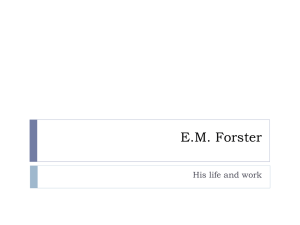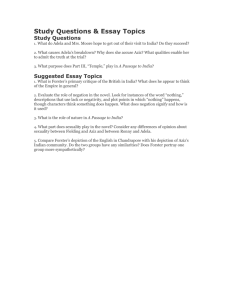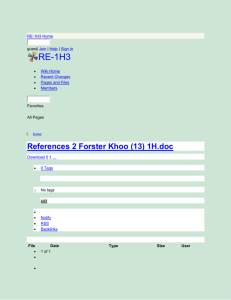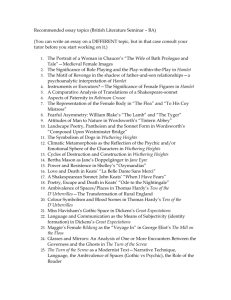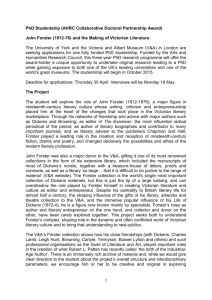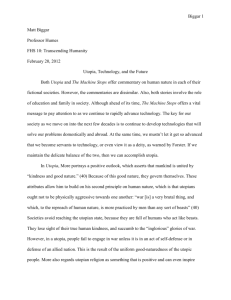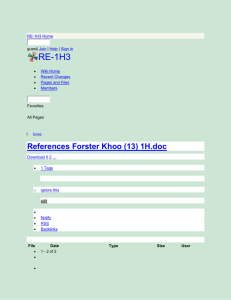Rites of Passage - Forster Communications
advertisement
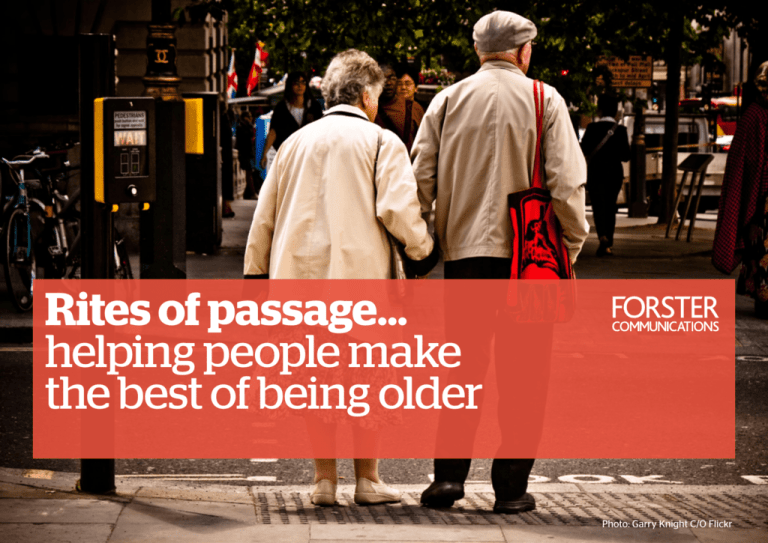
Rites of passage... helping people make the best of being older Photo: Garry Knight C/O Flickr Rights of passage How can we encourage people to recognise that becoming older is as much a rite of passage as becoming an adult? What can organisations offering products and services to older people do to encourage a change of attitude and approach? While becoming old is something most of us expect to do, growing older is still a mystifying experience, as much a rite of passage as any we face in youth. In many ways, it’s more difficult to grow into older age than become an adult. Having less to look forward to can lead to leaving it till too late. And there is so little guidance from organisations offering products and services to you. In our communications, we need to strike a balance between ‘forever young’ and ‘becoming older’. Imagine what we could achieve if we communicated our products and services in ways that influenced, persuaded and encouraged people to plan for their later life stages well in advance of need? To accept that becoming older is something they are growing into now, today. Something they can make more of, as they grow older. This isn’t about ‘living longer’, or ‘when I get old’, but about ‘as I grow old’ and ‘growing older now’. For many people, ‘getting old’ is a distant point in their life which will announce itself all in good time, almost like a line they will cross. The media tells them they are living longer, but there is little focus on the gradual move we all make from youth to middle age and older age. It’s difficult to believe that, in the 21st century, becoming old is still effectively a social taboo, best not talked about or dealt with. Taking a positive approach in a stoical age, Jilly Forster is an active promoter of the view that age beliefs can influence the ageing process and individuals can influence their age beliefs. Here, she points to five effective ways for engaging and communicating with people as they grow into the stages of later life. 1-2 1 Revealing reality Forster Insight It is possible to depict older people as diverse and dynamic in ways that are real and unsentimental l l l Much of the media focus on the lives of older people provides a picture of neediness and vulnerability, of people being passive, victims, ‘done to’. It is the task of communications activities aimed at or for older people to show that there are more positive ways to depict and describe the lives of people in later life, even where the focus is problem or issue-based. When it comes to communications with older people, blanket targeting is not acceptable. It’s never a good idea to address the target audience solely in chronological terms or depict older people as only vulnerable and needy. There are huge points of difference between successive generations and individuals within them. Forster has the experience and expertise to help organisations find and use authentic representations of older people – not ‘victims and heroes’, but real people who just happen to be older, enjoying and experiencing all that life has to offer them. Positive responses For the benefit of positive change, the reality that is worth revealing centres on some common principles of ageing well: staying active, mentally and physically; consuming a balanced diet while growing older; maintaining an active social life; thinking positively and managing stress; avoiding risk by using the health services. l If we, as organisations and companies seeking to send positive messages to older people, can help older individuals realise that they can take more control over their lives, they will engage in practices that enhance the lives they lead. l l Grandparents Plus (www.grandparentsplus.org.uk) is a national charity that promotes the vital role of grandparents and the extended family in children’s lives, particularly where parents are no longer able to care for their children. Forster worked with them to develop a new identity, to carve out a distinctive position for the organisation, with an up-to-date and relevant look and feel. While there is much focus on older people having to learn new skills, there are some dynamic examples of older people passing on their skills to younger people. The Amazings provides incredible activities run by retired people who share the skills, knowledge and passion they’ve picked up throughout their lives (www.theamazings.org). 2012 is the European Year for Active Ageing and solidarity between generations. New social enterprise United For All Ages (www.unitedforallages.com) is working with football clubs and the 2012 Olympics to focus on the role of sport in creating a Britain for all ages. 3-4 2 Getting closer Forster Insight It’s best to make the effort to get closer to older customers, by talking to them, mixing with them, recognising their diversity l l l If we see later lifestages as purely traditional and technophobic, we are missing a huge point when it comes to the power of communications. Media habits are changing. Online, satellite, Freeview, digital radio – all are transforming media consumption among older people. 45% of 55-75 year olds spend up to 30 hours per week online and 25% are considered ‘heavy users’ (30+ hours a week). 47% use either Skype or instant messenger services to communicate, and a quarter stream films/TV at least 2-3 times a month. A third of over-55s use the internet to access social networks, with the over 50s being Facebook’s fastest growing audience. If we assume that older people are set in their brand choices, market research belies this. Older households have been shown to buy as wide a variety of brands as younger ones. Here is the challenge: even organisations and companies currently offering products and services to older people must work harder to get beyond the stereotypes that exist for older people. Forster is helping a diverse range of clients use effective communications to encourage older people to maintain good health, be free from depression, stay optimistic, engage in social activity and live in a welcoming neighbourhood. Positive responses l Southwark Circle (www.southwarkcircle.org.uk) is a membership organisation that provides on-demand help with life’s practical tasks and a social network for teaching, learning and sharing. Open to all, regardless of levels of income, Circles is a model of how future social care services might look. l l l l Carers Trust is the new national charity providing help, advice and voice for the UK’s 6 million carers. Forster worked with the recently merged Princess Royal Trust for Carers and Crossroads Care to develop a new brand and help articulate a strong vision, mission, face and voice for all carers. www.carers.org Gransnet, the social networking site, aims to connect and give voice to Britain’s 14 million grandparents. Forums cover everything from politics to sex, pension planning to technology. www.gransnet.com The Good Gym pairs joggers with isolated elderly people, asking the runners to pop in for a chat during their daily exercise. Magic Me specialises in running intergenerational creative projects for mutual benefit, learning and enjoyment. Pen Friends seeks to link people who are interested in developing their creative writing skills with elderly housebound people who have great stories to tell but are not able to attend a formal group. Help the Hospices wanted to create a campaign that would bring together all the hospices in the movement to reach out within their local communities and talk about their work. Death isn’t an easy subject. Hospices are surprising places – positive, high energy and vibrant. We helped package the messaging, develop the creative work and deliver a range of collateral which enabled local hospices to take ownership of the campaign. 5-6 The big picture 1 1 25 the fastest growing user age group on facebook 4 2 3 13 2 24 1 50+ 1 12 2 22 21 2 1 9 30 7 0 4 16 28 9 3 27 5 2 18 6 19 8 7 of 55-75 year olds connect to their friends with either Skype or instant messenger services 15 10 6 47% 45% 33% of 55-75 year olds spend up to 30 hours on the internet a week of over 55’s use social networks 7-8 3 Identifying needs and aspirations Forster Insight It’s essential to discover how older people relate to your organisation and how you can help them get more from older age l l How do older people behave and when? What do they really think? How can you know any of this and how can your organisation relate appropriately until you know who older people are? Older people? What age are we talking about? Over 50s? 65+? 75 and older? Are they working? Can they? Do they want to? Need to? What about health? And what about wealth and poverty? At Forster, we believe there is no absolute definition of older age. But we know a lot about people growing older. People are experiencing the symptoms, attitudes and events of later life stages from their 40s and through their 50s, while still capable of regarding themselves as ‘young 60s’. Using our clear audience segmentation approach, we can help you embrace the sheer diversity of people as they grow older, while recognising that there are mind-sets to understand and tap into as people make their transition at their own pace. Positive responses l l Aged 65 is not considered ‘old’ today, yet people of this age can remember the end of food rationing in Britain or when Marilyn Monroe married baseball star Joe DiMaggio. Even 55 year-olds can recall The Beatles conquering America and Winston Churchill’s funeral. l Audience Segmentation. At Forster, we’ve reviewed different segmentation models, including: DEFRA, Age Concern/OLIVE, DH alcohol, Change4Life and Healthy Foundations. We’ve used our insights gained from both using these models and our experience of working with a range of clients on age-related issues. We’ve tested, shared and ’sense checked’ our approach in our older people panel and stakeholders seminars. Finally, we refined and quantified our audience segments using Mosaic and ONS data. When the Payments Council (www. paymentscouncil.org.uk) asked Forster to provide reassurance around proposed changes to cheques and raise awareness of alternative methods of payment among older audiences, we were able to bring our audience segmentation approach to bear - testing, developing and consulting the target audiences. We discovered that a typical response from Deniers was ‘I don’t even know where my cheque book is’. Whereas, at the other end of the scale, the more independently-minded Separators would say ‘Things change and you get left behind, it’s a fact of life.’ As a result, we were able to sculpt messages and communication channels to reach these very different older audiences. l l Forster is a partner and member of Age Action Alliance (http://ageactionalliance.org/), a partnership of organisations from civil society and the public and private sectors, which celebrates the lives of older people and their contribution to society. The Alliance works by engaging older people to find out what is important to them, then acting on it. Titan Holidays (www.titantravel.co.uk) understand their audience inside-out … they pick you up, drop your off, carry your bags … 9-10 4 Being clear Forster Insight It makes sense to speak clearly, plainly and truthfully and reduce older people’s barriers to understanding and participation l l l It is often assumed that older people need specific products or communications streams created for them. Often, they want to see their needs catered for in the mainstream – but they do respond to quality, ethics and impartial information. The worst thing we can do with communications aimed at older people is to stoop to manipulation and hype. Older people usually have a powerful nose for this. They are much more likely to value solid worth and practical information – authenticity, not artificiality. There is no getting around the fact that, as diverse as older people undoubtedly are, the older they get the more they require that we speak clearly, plainly and truthfully to them. We need to recognise their greater amount of life experience combining with deteriorating senses and capabilities. As a result, Forster believes in helping clients make ‘engaging communications’ the default approach to communicating products, services and messages aimed specifically at audiences aged 50+ and generally at audiences that include older people: Engage for INDIVIDUALITY; Engage for EQUALITY; Engage for PARTICIPATION. Positive responses l Sometimes, products and services aimed at older people need to be communicated effectively and successively to younger people, so that people in later life can get the benefit from them. l Keep Warm, Keep Well is a national governmental campaign aiming to protect those who are vulnerable in the winter months – older people, families on low incomes and people with long term health conditions. Forster works with partners in the community – local businesses, health services and community groups - to spread the word about the campaign, which promotes measures to keep homes warm, save money and energy, and encourage take-up of grants and benefits. Last winter the campaign worked with 64 partnerships, from businesses like The Co-op and Morrisons to housing associations and Citizen’s Advice Bureaus, resulting in the distribution of over a million leaflets across England. l Forster supports Age UK as members of their Engage Business Network, representing a wide range of consumer-facing business sectors in the UK and beyond. Members can access services designed to give them a better understanding of the needs of older consumers. Engage is launching its own accreditation scheme, enabling organisations to have their products and services formally endorsed as those that have the interests of people in later life as an integral part of their business thinking. Forster has worked closely with Abel & Cole, the organic food home delivery company, to help it extend its product/service offering to help meet needs for people in later life. Abel & Cole has always been concerned with quality of life and sustainability and saw no reason why it couldn’t adapt its existing home delivery service for the needs of older people. This was never about creating a new service, but about listening to what older people really wanted from the existing service and acting upon what the company learned. Forster’s communications task was to define the target audience and develop contact strategy. 11-12 5 It really works when the power of narrative, story and humour represent older people in ways they appreciate l l l Why are organisations wary, uncertain or even fearful of communicating directly with older audiences? Do older people suddenly acquire an aversion to the power of narrative, story and humour when they pass 50? Why take the easy way out by using a wishywashy, bland style? Older people may need the communication to take a slower pace – but they value conversation and direct dialogue. You may have pigeon-holed your older audience into a niche they cannot escape. You may see so much diversity that you cannot even picture the older audiences you want to target. Either way, you may be missing a great opportunity to engage your older audiences directly, with the humour and narrative they deserve. Forster has always known and shown that any audience can be reached and engaged more strongly when its motivations are understood and played back to it in a form it can accept and relate to. When it comes to storytelling, Forster works with our clients to prove that older people are no different to other people. Positive responses l Yes, minding your language, finding the right image and managing your digital approach all matter when engaging with older audiences. But, in case we have forgotten, it is time to remember that people over a certain age are human, too. “ “ Telling the story Forster Insight Just because I’m over 60 nobody wants to sell me anything any more Germaine Greer l Spread the Warmth is our annual campaign for Age UK, developed to help 350,000 people in later life feel warm, healthy and in touch with others during winter. We developed a storytelling platform that would work across several communication channels, bringing together new and existing winter services and activities including retail, fundraising, campaigning, information & advice. Activity included: fundraising partnerships with corporate supporters; a fuel poverty campaign, including a pledge to write to your MP calling for an emergency winter plan; an Information & Advice guide; a stock donation campaign, Donate a Coat; a Christmas DM appeal; a dedicated online hub area; national press inserts, regional radio ads and a promotional partnership with the Daily Mirror; a mass participation fundraising event (Bobble Day). The storytelling nature of the campaign enabled it to achieve extensive editorial coverage and in it’s first year over £853,000 was raised. OXO Good Grips is dedicated to providing innovative consumer products that make everyday living easier. Their transgenerational products all follow Universal Design principles resulting in a salad spinner can be used with one hand, liquid measuring cups that can be read from above without bending over, kettles with whistle lids that open automatically when tipped to pour and tools with pressure-absorbing, non-slip handles that make them more efficient. l l Bovis Homes was finding its Retirement Living product a difficult proposition to sell. The target audience of 55+ are too young to think about planning for a retirement property. They needed to position retirement products in a more positive light in relation to the market place. Forster carried out consultation to inform a communications strategy that outlined short and long-term goals for Bovis. Short term goals included a fresh look and feel for the brand, to boost immediate sales for existing development, and recruitment for new projects. Longer term, we outlined ways in which Retirement Living as an ethos could be communicated, spurring a mind shift in younger people preparing more readily for retirement. Get the online literacy rate up. No one should be without a computer and basic email, Google, current affairs and online shopping skills. Government services could save £900m annually, if the 8.4 million of us currently digitally excluded were to move just one government contact a month online. Forster are official partners with raceonlline2012. 13-14 Forster is a campaigning communications company, working with clients to set new agendas, influence attitudes and change behaviour. We understand the ingredients for audience engagement and specialise in research and insight, brand communications, digital and PR. Forster has a strong reputation for creating and delivering common sense communications which meet the diverse needs and aspirations of older people. We help clients who want to provide practical, relevant and affordable products and services to people over 50 and in later life. If you’d like to discuss how we can inspire positive change together, please contact: Jo Foy joanna@forster.co.uk Forster 49 Southwark Street London SE1 1RU T 020 7403 2230 www.forster.co.uk © Forster March 2012
